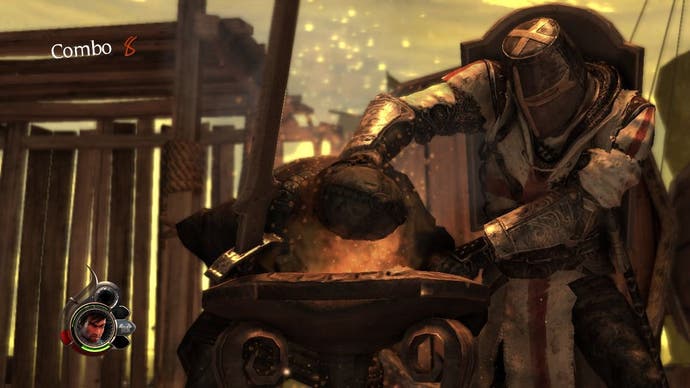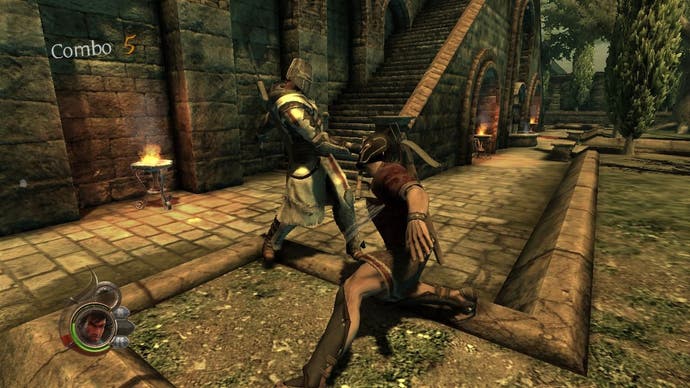The Cursed Crusade
Camera tricks.
On paper, The Cursed Crusade sounds like a very promising and long-overdue idea. Set in the winter of 1198 AD, the game catches up with two merry travellers each pursuing their own agendas until fate draws them together: Denz de Bayle, on the hunt for his Templar father who vanished during the events of the Third Crusade, and Esteban Noviembre, a petty thief with a heart of gold.
It's a game which wants to take us back to the good old days of sitting huddled around a computer, the prematurely arthritic fingers of a younger generation of gamers competitively clawing their way over the keyboard.
That immediately co-operative experience of hack-and-slash with all of the joys of sibling bitching - except now we can at least remove the physical agony and take advantage of split-screen, control-pad gaming. Players choose whether to play co-operatively, as the two protagonists, or as Denz with an AI-controlled Esteban.
But here's another nostalgia trip. Growing up, our annual school fete would regularly feature a bicycle that had reversed controls: steer left and the bike turned right, pedal forward and the bike would travel backwards. An endless succession of outrageously comical dads and granddads would clamber onto it. If they got across the 20 meter finishing line without suffering a concussion, they'd be rewarded with a prize.

At the moment, that's kind of what The Cursed Crusade feels like - except the prize is doing it all over again in the next level.
Or so it seems based on the five levels we've been able to play so far. There doesn't appear to be much in the way of a genuine connection or chemistry between the protagonist and his lighter-hearted mercenary companion.
Denz is a man who lacks the self-awareness necessary to balance out his melodramatic, burly rhetoric. At the other end of the spectrum, Esteban does everything but make lewd remarks at gringo chicks, take a nap halfway through combat and then ask for a shawd-a-tekeela.
And so a one-dimensional comedy foil finds himself partner to an equally flat man-on-a-mission, breaking all the Templar rules but getting the job done. The intention is clear, but the end result is open-mic night at the old Mexican Cantina – and the hecklers are getting restless.

While the dialogue isn't all that funny, it is very often crafted with cringe-making simplicity : "Let the curse... Do the worst," making the hero into a sort of 12th century Paddy McGuinness welcoming Satan onto the show.
Likewise, Denz's purportedly plaintive musings on the abrupt disappearance of his father are delivered in the manner of a man idly wondering where he might have left the hedge trimmer.
The good news is the meat and bones of the combat does contain some gloriously over-the-top violence (you can plant a sword through someone's eye before decapitating them, for example). However, at this stage in the development process, there's a distinct lack of tactile feedback between button-press and on-screen action.


